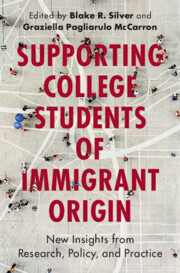Refine search
Actions for selected content:
3 results
Chapter 1 - Understanding College Students of Immigrant Origin
- from Part I - Beginnings
-
-
- Book:
- Supporting College Students of Immigrant Origin
- Published online:
- 16 May 2024
- Print publication:
- 23 May 2024, pp 3-16
-
- Chapter
- Export citation
Chapter 15 - Understanding the Personal Support Networks of First-generation College Students from Immigrant Backgrounds
- from Part III - Institutional Arrangements
-
-
- Book:
- Supporting College Students of Immigrant Origin
- Published online:
- 16 May 2024
- Print publication:
- 23 May 2024, pp 310-331
-
- Chapter
- Export citation

Supporting College Students of Immigrant Origin
- New Insights from Research, Policy, and Practice
-
- Published online:
- 16 May 2024
- Print publication:
- 23 May 2024
